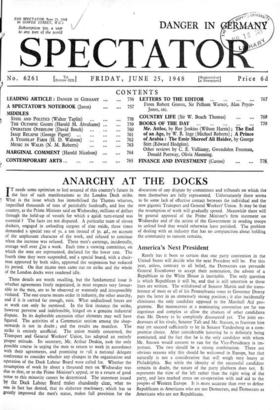America's Next President
Rarely has it been so certain that one party convention in the United States will decide who the next President will be. For this year, unless, contrary to all belief, the Democrats can persuade General Eisenhower to accept their nomination, the advent of a Republican to the White House is inevitable. The only question is which Republican it will be, and that is still uncertain as these lines are written. The withdrawal of Senator Martin and the trans- ference of most or all of his Pennsylvania votes to Governor Dewey puts the latter in an immensely strong position ; it also incidentally eliminates the only candidate opposed to the Marshall Aid pro- gramme. But manoeuvres at a nominating convention are far too ingenious and complex to allow the chances of other candidates than Mr. Dewey to be completely discounted yet. The joint en- deavours of his rivals, Senator Taft and Mr. Stassen, to frustrate him may yet succeed sufficiently to let in Senator Vandenberg as a com- promise choice. After considerable havering he is definitely being nominated, and the fact that he is the only candidate with whom Mr. Stassen would consent to run for the Vice-Presidency is im- portant. The two should be a strong combination. There are obvious reasons why this should be welcomed in Europe, but that naturally is not a consideration that will weigh very heavy at Philadelphia. But while the identity of the successful candidate remains in doubt, the nature of the party platform does not. It represents the view of the left rather than the right wing of the party, and lays marked stress on co-operation with and aid to the peoples of Western Europe. It is more accurate than ever to define Republicans as Americans who are not Democrats, and Democrats as Americans who are not Republicans.






























